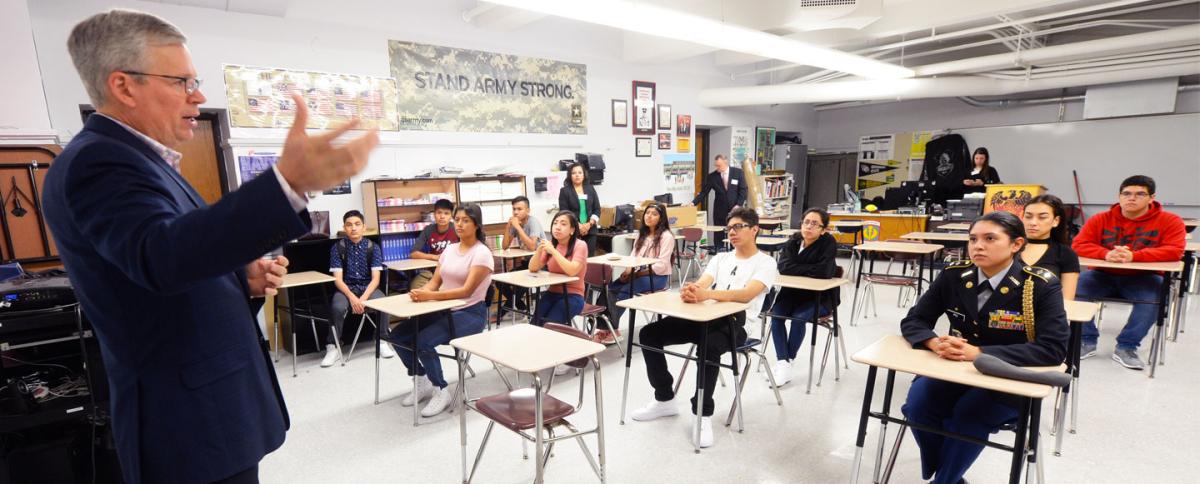Junior Achievement volunteers help students make ‘cents’ of their future
Wells Fargo team members share the impact Junior Achievement has had on their lives — and why they enjoying giving back to future generations.

Junior Achievement volunteers help students make ‘cents’ of their future
Curt Todd still remembers serving as CEO of his first business in high school, selling piggy banks and car rearview mirror decorations with his school’s mascot on them. He and a few classmates sold stock and used the money to buy materials and manufacture their products, which they sold at sporting events.
“We made a profit and were able to pay shareholders — our parents — a dividend,” said Todd, 55, a wealth advisor for Wells Fargo’s Wealth and Investment Management in Naples, Florida. “Back then, I didn’t know it would be relevant. I just knew I liked business.”
He started that high school business through a Junior Achievement USA® program. Today, Todd is one of more than 50 Wells Fargo team members who serve as board members for the organization, which seeks to prepare young people for success in a global economy. Junior Achievement volunteers provide programs and resources focused on work readiness, entrepreneurship, and financial literacy to about 4.8 million school-age students each year, according to the organization.
Wells Fargo and its team members have a long history of supporting Junior Achievement. Most recently, in 2016, Wells Fargo donated more than $1.5 million to 61 local Junior Achievement offices, and in June 2017, the company donated $100,000 to Junior Achievement of Chicago.
“Wells Fargo has been one of our greatest supporters,” said Jack Kosakowski, president and CEO of Junior Achievement USA. “This past year, the company received a Gold U.S. President’s Volunteer Service Award for providing more than 15,000 volunteer hours to JA programs. We greatly appreciate Wells Fargo’s continued support of our mission to inspire and prepare young people for success.”
Lifelong lessons
For team members like Todd, connections to Junior Achievement run deep. Todd first became involved with the organization more than 40 years ago, as a fourth-grade participant. “I remember they made learning about business, capitalism, and entrepreneurship fun,” Todd said. “I knew I liked math and finance, and the lessons from Junior Achievement stuck with me through high school and college.”
Todd said Junior Achievement was instrumental in his decision to major in business in college and later pursue a career in banking. Once he started his career in 1985, Todd began volunteering with Junior Achievement, teaching students in third through 12th grades. He became a board member in 2008, and currently serves as the vice chairman for Junior Achievement of Southwest Florida’s board of directors. “I’ve lived in a lot of places and always volunteered — teaching wherever I am,” Todd said. “It’s fun to give back.”
Rita Nicholson is another team member who has a long history with Junior Achievement. While she did not participate as a child, her children did more than 20 years ago. Nicholson, a commercial lines manager for Wells Fargo’s Wholesale Banking in Denver, said she still has a “check” her youngest son wrote in 1993. “I just remember the kids always talking about it being fun, but it also taught them things they needed, compared to things they wanted, and explained expenses,” Nicholson said. “It taught them you don’t just get money from Mom and Dad. You have to work for it and be careful with your money.”
Nicholson said the lessons her sons learned through Junior Achievement have stayed with them and helped them become fiscally responsible adults, so when she had an opportunity to volunteer, she was thrilled to make an impact on other children. She has taught for about 15 years and currently serves on the board and executive committee for Junior Achievement of Southern Colorado. “Junior Achievement is dedicated to teaching children financial literacy, and I am happy to be a part of that,” Nicholson said.
‘You can see the lightbulbs go on’
While both said they have enjoyed working with students of all ages, after volunteering for years, Todd and Nicholson have their favorite ages and lessons to teach. For Nicholson, it’s third- and sixth-graders because of their excitement and ability to focus and retain the material. “You can see the lightbulbs go on,” Nicholson said. “In third grade they want expensive cars, but then reality hits. We play a game where each student is assigned a career and has to spend within the limits of their salary. When you see that they start to understand and get it, you know the long-term impact it has made on them.”
Todd said he prefers fifth graders because, “the kids are like sponges.” He appreciates that Junior Achievement teaches the same concepts he learned about as a child, but has updated the curriculum throughout the years to make it relevant. He supplements the curriculum with his own stock market game. The students select two or three companies and monitor how they perform on the stock market. “They always pick companies relevant to where they are in life,” Todd said. “The kids love it. They watch the news, and we discuss what the trends mean.”
He and Nicholson agree that there are important long-term effects from Junior Achievement — and they have seen them firsthand — which is why they continue to support the organization. “For a lot of these kids, economic education is not a part of the curriculum in their school system, so I think it fills a void,” Todd said. “It’s giving them the tools to be successful in a global economy.”

